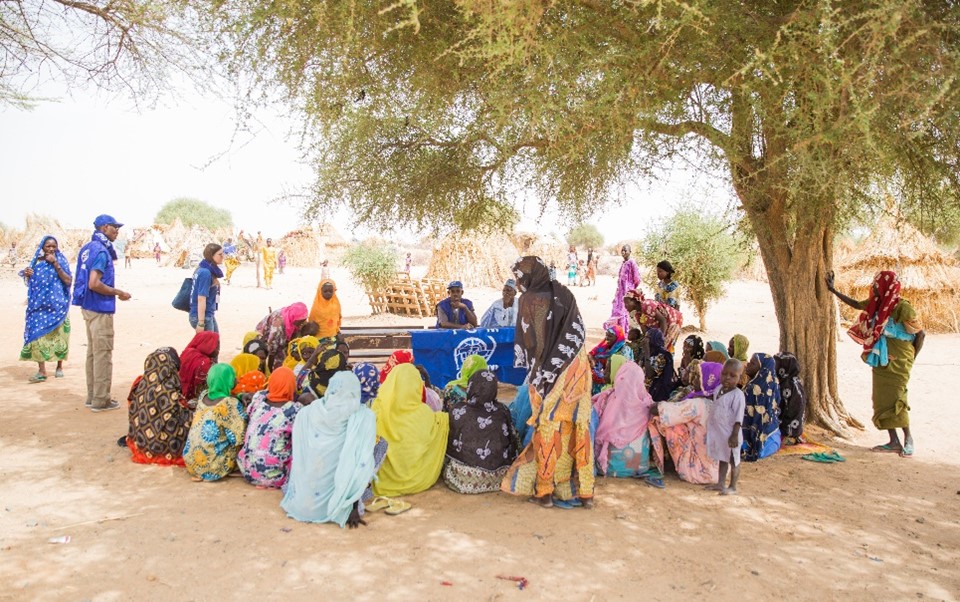
Focus Group Discussion with women with Djalori, Niger – Picture: Amanda Nero
Qualitative research methodology is frequently used in social sciences, to deeper explore questions such as “What, Why and How? “.
When conducting research on migration, a qualitative approach may help you better understand the particular causes or impact of migration on women, for example, or the need for assistance people who are physically or psychologically harmed during their journey might have.
The article provides key recommendations for using a qualitative approach in your research. You can also refer to the videos on qualitative interviews and focus groups for more detailed information on data collection methods.
What is qualitative research and why is it important?
Qualitative research provides information about the subjects of a research project to understand their experiences, their points of view, their migration trajectories.
How To Conduct Qualitative Research?
Qualitative research requires preparation. Once you have clearly defined your case study, your objectives, and the participants in your research, you must think about how you will organize your fieldwork. The context of the interview or focus group is important and can significantly influence its quality. You should find a quiet place, appropriate for discussion, where people feel confident and safe to express themselves freely.
It’s also important to establish a trust-based relationship with the research participants. Always explain your analysis methodology and be clear and transparent about the research process.
Next, consider important aspects such as subjectivity, because as researchers we are influenced in part by our own histories, values, and opinions. Throughout the research, keep in mind the goals behind the data collection.
Although a broad range of tools is available for qualitative research, we recommend two in particular: the qualitative interview and the focus group discussion.
How To Lead Qualitative Interviews?
The purpose of a qualitative interview is to collect information about an individual or group of individuals. To lead your qualitative interviews, you can use open or closed discussions.
Whether you’re planning a face-to-face or a remote interview, it’s always necessary to do some research on the participants: to have an overview of the social and cultural context of the area of research, on the characteristics of the social group such as the languages spoken, the religion, and the customs. Look for information through various sources, such as: academic literature, official reports by international organizations, print media, blogs, or social media.
Security aspects should be considered to assess the risks to both interviewer and respondent.
Interviewees should be able to express themselves freely. The researcher will not over-interpret the answers s/he receives or interrupt or take over. However, s/he can re-start the discussion.
Be aware of the respondent’s non-verbal language, as this can indicate fear or embarrassment which can play a role when collecting data. To make the interview flow smoothly and put the participants at ease, you should adapt the tone of your language, words and expressions.
How To Organize Focus Group Discussions?
Focus group discussion allows us to learn more about opinions, attitudes and feelings that do not appear in the qualitative interviews. This research method is usually inexpensive and easy to implement and involves between six and twelve people who share the same characteristics which are relevant to your research.
A facilitator and an interviewer oversee the focus group discussion in the field. To do this, tasks should be clearly defined before the meeting. You should know who will ask questions, and who will take notes or do the recording. You can make this decision depending on the skills and background of your team, but also based on the characteristics of the people you’ll meet (e.g. for a focus group discussion with only women, it might be a good idea to have a woman ask the questions, depending on the subject).
Before you the start of the discussion, make sure you know the order of questions that will be asked, following a pre-established interview guide.
Remember to inform participants well in advance and inform the local authorities of your plans.
Tips
Qualitative research results in more subjective insights and information than those generated by quantitative methods (such as individual questionnaires or systematized surveys). The focus of the data will be on speech and narratives rather than numbers and figures. Therefore, it’s not necessary to conduct large numbers of interviews or focus groups discussions. Taking the time to complete a small number of properly conducted interviews can be more efficient.
When conducting interviews with vulnerable individuals or population groups who have suffered trauma, it’s crucial to consider the impact of the interview on these people and to respect your organization’s protection and confidentiality standards.
These couple recommendations should help you to integrate a qualitative aspect into the preparation or implementation of your field research. Don’t forget that beyond theoretical learning, repeated practice will enable you to obtain the best results!
This article was written by Bérénice Boukaré, IOM Research and Learning Consultant.



